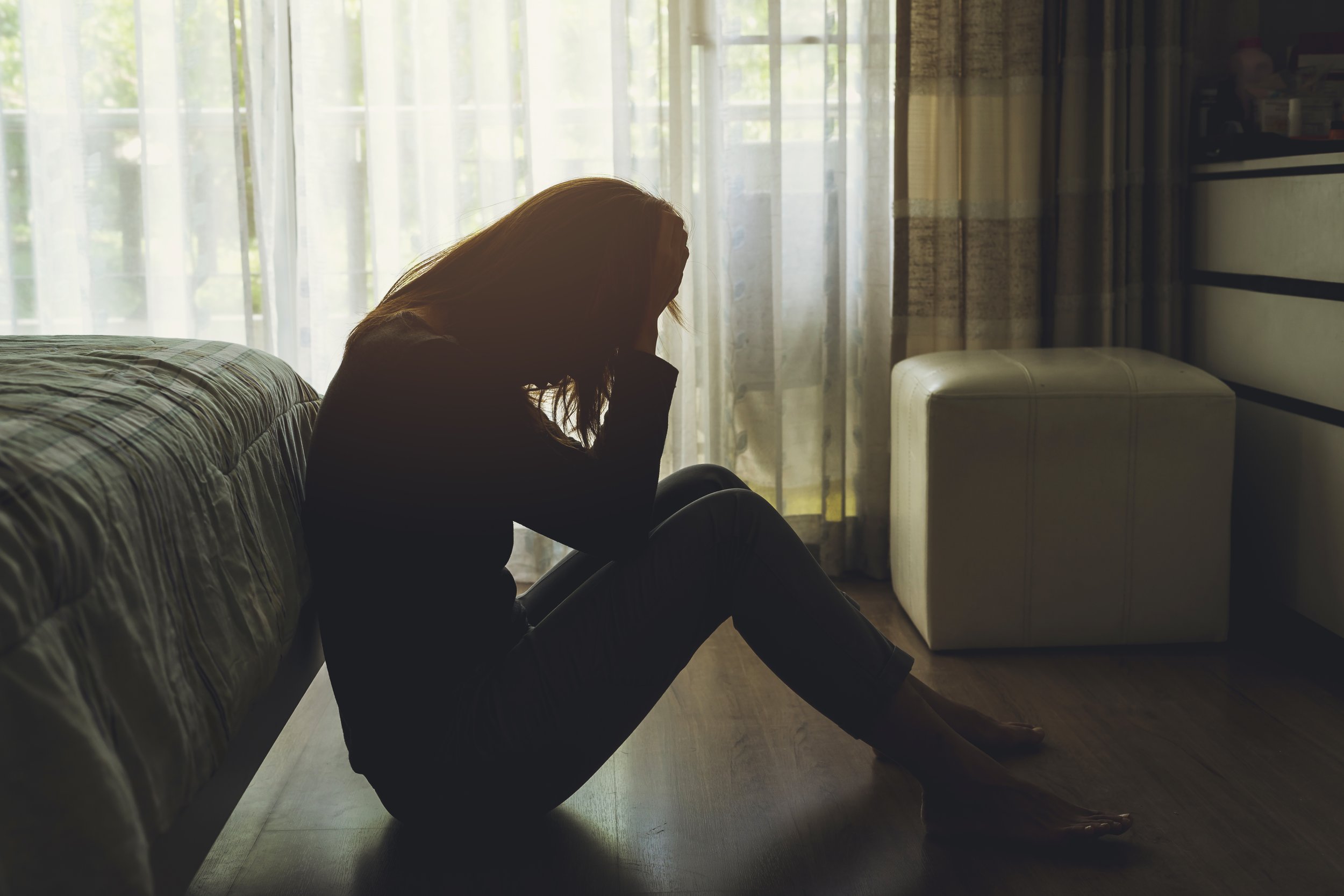Who I Was With Bulimia
Unveiling the part of me that went unseen
Photo by Kittiphan via Adobe Stock.
Note: This article contains details about suicidality and bulimic episodes some may find disturbing or triggering. Please use your own discretion before reading.
I’ve never talked about it like this before.
Yeah, I’ve disclosed to friends, coaching clients, and my followers on social media that I battled bulimia for nearly 15 years. I’ve shared how bleak life was and that I was prepared to die before the age of 30, whether as a result of my eating disorder or by suicide.
But that’s pretty much where it begins and ends.
Most of my focus as an eating disorder recovery coach revolves around my journey to food and body liberation — not the grim days that preceded it.
In a way, I’ve purposely avoided sharing too much about my pre-recovery story because I’ve seen others do this and it horribly backfire. Those in the pre-contemplation or contemplation stages of change can hear these stories and think, “I’m not sick enough to get help,” or “She was far worse off than I am.”
But when carefully crafted, these stories can be the very propellant that pushes someone into taking action.
And the reality is, millions of people are out there, right now, living the secret life I once was as they battle an eating disorder.
So, this recount is for them and the many others who’ve made their illness known but are dubious about pursuing the fight to overcome it.
May my story instill the hope that they, too, can not only recover from their eating disorder but that they’re worth every ounce of painstaking energy that goes into it.
12 Years Old: Breaking Average
In so many ways, I was an average pre-teen girl growing up in the late-90s. I played softball and rollerbladed. I danced to Britney Spears in my bedroom and went to slumber parties. I created my first email address (RIP squeezemycheese@msn.com) and instant-messaged with my friends and boy crushes for hours on end.
Then, one day, I did something not so average. Something I’d never done or known anyone who had but recently learned about from a boy at school.
I made myself vomit.
I swore it would just be this one time. See, for about a year up to that point, I’d struggled with anorexia and fantasized about food because I allowed myself so little of it. I just needed a single “fix” of ice cream, and then I’d be good to go.
But then it happened again. And again. And again.
In no time at all, I met the diagnostic criteria for bulimia nervosa.
We always had a stockpile of snacks at home, so despite eating large quantities of them, my mom or siblings never grew suspicious of me. I also purged in the wooded area next to the apartment complex where we lived to eliminate any risk of them finding me out.
Bulimia had become my baneful little secret. A secret, unbeknownst to me at the time, I would carry for another 14 years.
12–17 Years Old: Popularity and Pleading for Forgiveness
Part of what fueled my eating disorder was my insatiable need to have something most every kid my age wanted: popularity. My theory went as such: restrict food > be thin > get more friends/a boyfriend.
I went through many school days with only nibbles of food in my belly. If it was volleyball or soccer season, I ate a little extra so I could keep up with my teammates. I wound up bingeing and purging when I got home because semi-starving myself intensified the urge to eat uncontrollably.
All the while, I portrayed myself as the class clown, the life of the party. I never reached Homecoming Queen nominee status, but I did bounce around between multiple friend groups.
I was in advanced placement classes and maintained a 3.9 GPA.
I dazzled audiences with my dance moves in show choir and was first chair alto saxophone and head drum major for our 180-person marching band.
I had duped everyone — even myself, at times — into thinking I was a happy-go-lucky, thriving teenager.
But no one saw me crying in the shower because I was so sick and scared.
No one saw me looking at my reflection in the mirror and telling myself how hideous, fat, and worthless I was.
No one saw me keeled over after purging, pleading with God to forgive me for my gluttonous, grotesque behavior. I was really immersed in my faith at the time and believed I was going to hell for having bulimia.
After every episode, I swore to my then higher power that it would be the last. Tears streaming down my face, I begged him not to give up on me. But week after week, month after month, year after year, the scene kept replaying.
18–22 Years Old: A Not So New Chapter
The summer after my senior year of high school, I experienced my first seizure while driving a jet ski. I crashed into a dock and suffered a collapsed lung (almost two), a compound fracture in my right arm, several broken ribs, and a smashed-up face.
As terrifying as my accident was, my nearly two-week stay in the hospital as a result of it showed me I could survive without bingeing and purging. I just needed a barrier or distraction to prevent myself from using the behaviors.
Six weeks later, I’d be moving into an apartment-style dorm with three complete strangers. Perhaps this — and my new life in college, in general — could be that barrier.
Unfortunately, my keenness outweighed my hopefulness. I quickly learned my roommates’ schedules and when I could be alone with my behaviors.
But after a couple instances of them arriving home early or not leaving at their normal times, I realized I wasn’t guaranteed any solitude. I secretly ate in my bedroom and blared music to conceal the purging. They overheard me on more than one occasion, and I either blamed it on being sick or hungover.
Swollen lymph nodes, puffy cheeks, and blood-shot eyes. A broken-out chin and cold sores on my lips from the stomach acid that too often coated them. This was the face everyone knew to be mine.
Still, I carried on as a social butterfly. Like my friends, I went to parties, took shots of cake-flavored vodka, and ate fourth meal at 1 a.m. Unlike my friends, I made myself pay for it.
To make matters worse, at 19, I entered a romantic relationship with a man who would physically and emotionally abuse me for the next three years.
In retrospect, my life hadn’t changed much at all in college. It was still an endless stream of lies, deception, self-hatred, and suffering. What’s more, I’d completely lost sight of who the real me even was anymore.
22–24 Years Old: London Hiatus and Living Alone
Photos of the author at age 22.
Age 22 was an unforgettable year. I finally declared my major (journalism) and became entrenched in various student organizations.
One day, my friend, Kristen, asked if I planned to register for some international communications class that entailed a 17-day trip to London. Impulsive me replied, “Hell yeah, let’s do it!”
And so we did. Shacked up in a hotel room with Kristen, this trip was the first time since my jet ski accident I took a real hiatus from my eating disorder.
In all actuality, though, I was too busy having the time of my life to even think much about bingeing and purging. I was in this magical city, with incredible friends, drinking way too much Strongbow, and crushing hard on one of my classmates. When day 17 came and everyone was so eager to get home, I wanted nothing more than to stay in London forever.
On the flight back to the States, I remember thinking to myself, “Perhaps my bulimia really is gone for good now.”
Then I returned home to the most somber news. My sister, who I shared my apartment with, revealed her best friend hanged himself in her closet. To add to the shock, she informed me she’d be moving back home to mourn her loss and find a safe haven from the toxicity that surrounded her life at the time.
Before I knew it, I was living on my own. At least with my sister there I had to be stealthy about my eating disorder. But now I had free rein to do what I pleased. And what I pleased meant hitting an all-time low with my bulimia.
I remained busy with classes, extra-curriculars, working on the weekends, and spending time with my London boy. But most of my time alone at home entailed exercising or bingeing and purging.
Still, not a waking soul knew of my struggle.
24–26 Years Old: Say Something
One evening, my friends and I went out to dinner at a place known for its scratch macaroni and cheese. While everyone else boxed up their leftovers, I scooped up the last bite from my bowl and blurted out, “Who wants ice cream?” In my mind, I’d already overdone it with the pasta and knew a purge was in my near future, so I wanted to keep eating.
One of them said, “Girl, how are you the size you are and eat like you do?” “Genetics and all that running she does,” another friend retorted.
“Or the fact that I lead a double life you know nothing about,” I shamefully thought to myself.
After dessert, we said our goodbyes, and I jetted home to expel my body of the food I’d so aimlessly consumed.
In the midst of my purge, I suddenly found myself keeling over on the bathroom floor. My heart was racing, and I was struggling to breathe. “Am I having a heart attack? A gastric rupture? A different kind of seizure? Could this be it for me?” I wondered.
Uncertain of my fate, I lay there frantic and frightened. While I was severely depressed and often contemplated suicide, I’d never actively attempted to take my own life.
I can’t remember if I didn’t call 911 because I was too ashamed or for some other reason. But, fortunately, my body settled after a few minutes.
I stood up, looked at my wet, inflamed face in the mirror and muttered the words I wish I had the know-how to say 12 years sooner.
“You need to say something.”
For so long, I’d lived with two dichotomous notions. Either I would figure out a way to beat the bulimia on my own, or I would continue living my secret double life. Deep down, I didn’t want either, and this scare solidified that.
So, as difficult as it was, I took a leap of faith and disclosed my long-lived secret to my boyfriend. Though I feared his initial reaction, I knew how much he cared for me and that him knowing could change everything.
I didn’t share all the details — I felt incapable of that. But I shared enough for him to know I was extremely unwell. The next day, he showed up at my door with a pamphlet for a local therapist trained in treating eating disorders.
It was the start of my next two years in outpatient treatment. It was the start that saved my life.
Age [Whatever You Are]: *Your* Moment
Whether you’ve been secretly battling an eating disorder for a few months or 50 years, I want to make three things very clear:
You are sick enough
You deserve help
You can’t do it alone
Sadly, there are thousands upon thousands of eating disorder stories like mine, but each one is still different. Some cases are more severe, some less. But that’s all irrelevant.
What matters is knowing, at your core, you have an unnatural or undesirable relationship with food. That realization, alone, warrants getting help.
It doesn’t matter how much you’re restricting, what you weigh, how often you’re purging, or how much you’re bingeing. Yes, certain factors will determine the level of treatment you need, but you deserve help, regardless.
The first step is saying something. Is there someone who’s been there for you when you confided in them about other personal matters? Someone who has an understanding of mental health issues, maybe even eating disorders? Someone who exudes kindness and compassion?
Think through who might be the best person to entrust. Remember, too, it’s not up to this person to save you, but disclosing to them can motivate you to get the professional help you need.
If you can’t think of anyone, or you feel more comfortable speaking to a professional first (e.g., therapist, physician, counselor), that is okay. You can eventually disclose to loved ones as you’re seeking help. The important thing is, you’re not going at it alone.
I hope you can also learn from my experience and not hold out for a wake-up call or a feeling of readiness to tell someone. If you do, you may never get the chance.
As long as a piece of you recognizes there is a problem and wants something different, you are ready to seek help. Here are some resources to get you started:
Project HEAL (support for every body, regardless of socioeconomic status)
Contact me if you have questions about treatment services or recovery coaching
Who you are with your eating disorder is not who you are destined to be.
You can heal yourself.
You can find yourself.
You can be the version of yourself you wish for you and the rest of the world to see.



